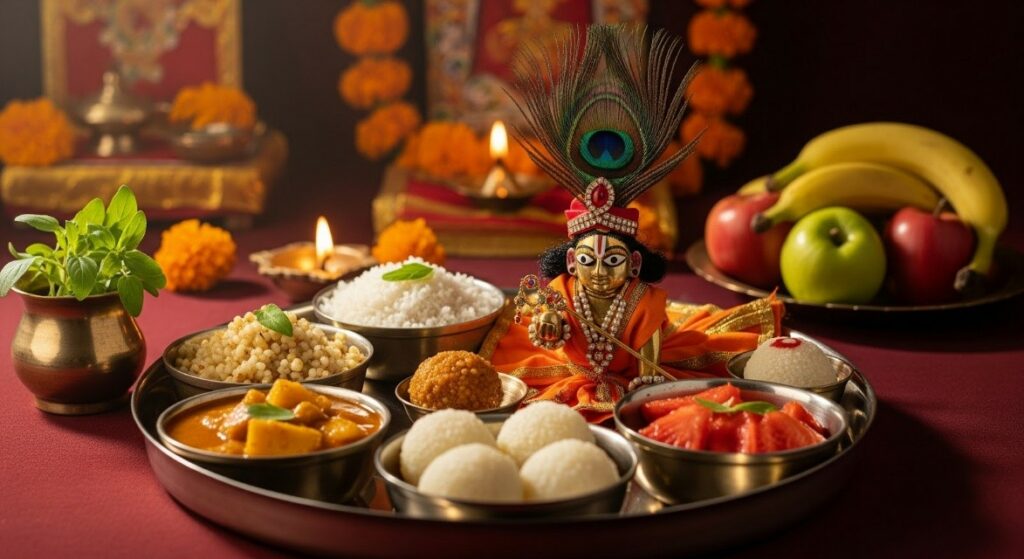There’s something quietly potent about Krishna Janmashtami that I’ve always felt, even as a child. It’s not loud like Diwali, with its fireworks and frenzy. It’s not as deliciously messy as Holi. Janmashtami carries a kind of hush—an invitation, almost. One that arrives just after midnight, when the world sleeps but something in me stirs.
And right at the centre of this sacred stillness? The Janmashtami fast.
Not because I have to. But because something deeper within wants to. It’s less about skipping meals, and more about allowing stillness to settle in. This day always reminds me that fasting isn’t just about what’s on the plate or what’s not. It’s about what shifts inside when the body pauses and the soul finally gets a chance to speak up.
Where It All Begins: The Tradition Behind the Fast
Why do we celebrate Krishna Janmashtami? For me, it’s always been about the birth of Lord Krishna—but more than the story, it’s the feeling. The divine moment when, they say, the skies shimmer, time folds in on itself, and for a brief instant, the universe allows the miraculous to unfold.
I’ve always been moved by how people fast on this day. Not to punish the body, but to prepare it. To honour the moment, to make space for reverence, for grace, and for something beyond the physical.
Janmashtami reminds me that stillness isn’t empty. It’s full of meaning, if I just let it in.
Historically, the Janmashtami fast reflects:
- Discipline over indulgence.
- Stillness over celebration.
- Presence over performance.
Across India, how we celebrate Krishna Janmashtami varies beautifully:
- In Vrindavan, some take a nirjala fast—no food, no water.
- In Maharashtra, it’s phalahar—fruits, milk, and calm.
- In Tamil Nadu, a satvik fast might include tender ash gourd cooked in coconut milk—cooling and digestive.
No two homes do it the same way. And yet, the essence is shared: Step back so something higher can step in.
When is Janmashtami in 2025?
Janmashtami has always felt like a midnight secret shared between the divine and the devoted. According to the Vaishnav calendar, Sri Krishna Janmashtami in 2025 will be celebrated on Saturday, 16th August. On this day, I observe a fast until midnight consuming only Ekadashi prasadam as a way to honour the divine birth of Lord Krishna.
The fast isn’t about denial; it’s about preparation. Slowing down. Making space. And then, just past midnight, when the world is quiet, I break my fast with offerings that feel sacred—made with care, offered with love.
For many, Janmashtami isn’t just a home celebration it’s something people travel for. Cities like Mathura and Vrindavan transform into luminous spiritual hubs. I’ve been lucky enough to witness it once, and the memory still lingers: midnight aartis, street plays on Krishna’s life, temples overflowing with chants and devotion. You don’t just see the celebration—you feel it.
The Sacred Why: Fasting as a Spiritual Practice

Krishna Janmashtami fast is more than abstaining from food—it’s a gentle act of devotion. Think about it. Krishna wasn’t born in luxury. He arrived in a prison cell, under threat, in the dead of night. Yet his birth represents light overcoming darkness, joy bursting through fear.
Fasting during Janmashtami is, in many ways, our own symbolic reenactment of that.
- To silence the noise of hunger long enough to hear what’s underneath.
- To experience restraint not as suffering, but as freedom from it.
- To remove the excess—physical, mental, emotional—and clear space.
This isn’t about how long you can go without eating. The benefits of Janmashtami fasting lie in what happens when the distractions are stripped away and what’s left is—well, you.
What Ayurveda Has Known All Along
Ayurveda doesn’t see fasting on Janmashtami as a strict ritual. It treats it as a tool for balance and spiritual growth—when done mindfully.
Here’s what it offers as Janmashtami fast benefits:
- Rekindles your Agni (digestive fire).
- Helps balance your doshas when aligned with your prakriti.
- Sharpens mental clarity and brings stillness.
- Grounds your subtle body by removing heaviness and excess.
Knowing Your Dosha Before You Begin
Janmashtami fast rules aren’t universal. Ayurveda encourages a personalised approach.
How to do Janmashtami fast the right way? Start by knowing your dosha.
If you’re Vata
Light, mobile, prone to anxiety.
Fasting can deplete you if done too intensely.
Try:
- Warm milk with cardamom.
- Soaked almonds.
- Ghee in moderation.
If you’re Pitta
Sharp, focused, prone to irritability.
Your fast needs to cool, not inflame.
Try:
- Coconut water.
- Sweet fruits (pears, melons).
- Cooling teas: cumin or coriander.
If you’re Kapha
Heavy, grounded, often sluggish.
Fasting can be deeply rejuvenating.
Try:
- Ginger or Tulsi teas.
- Light fruits.
- Warm lemon water.
What to Eat (and Not Eat) on Janmashtami
Whether you’re wondering how to do Janmashtami fast properly or just want to simplify your meals, the focus is on Satvik purity—foods that are light, clean, and energising.
Include:
- Ripe bananas, stewed apples, soaked dates
- Sabudana khichdi with cumin, ghee, and rock salt
- A2 cow’s milk, homemade yoghurt
- Herbal teas (ajwain, ginger, tulsi)
- Soaked nuts: almonds, walnuts, figs
Avoid:
- White sugar and caffeine
- Refined oils, packaged foods
- Anything that feels ‘heavy’ or overstimulating
This is not a detox fad. This is the food of sages—prepared with intention and quiet reverence.
Parana: Breaking the Fast with Grace
Parana is the final step in Krishna Janmashtami fast observance. It’s the moment you gently reintroduce food.
Janmashtami fast rules for breaking your fast include:
- Be gradual: Start with warm water or light tea
- Be mindful: Include ghee or light kheer (barnyard millet, jaggery)
- Be nourishing: Ease into simple, warm meals
No spicy treats. No sudden indulgences. Let your body reawaken slowly and peacefully.
Also Know: Top 7 Traditional Fasting Items for Janmashtami
The Quiet Modern Power of an Ancient Fast
In a noisy world, fasting on Janmashtami is like switching off the static. Science supports it too:
- Gut rest aids digestion and absorption.
- Intermittent fasting can improve metabolic health.
- A quiet gut can lead to a quiet, clear mind.
But beyond the science, Janmashtami fasting helps you rediscover rhythm—your own natural one.
And So, We Return
Why is Janmashtami celebrated? To remember the divine birth of Lord Krishna—a story of hope, resilience, and love. And how do we celebrate Krishna Janmashtami? With devotion, simplicity, and presence.
Fasting is how we prepare.
We say: I’ll pause. I’ll listen. I’ll make space.
This Janmashtami, nourish your spirit and your body. Whether you’re cooking at home or seeking sattvik, ready-to-eat meals, OMKITCHEN supports your journey inward—with food that feels like devotion.
FAQs
Can I fast if I have a medical condition?
You might, but always consult your physician. Modified satvik or fruit-based fasts are often safer. No one benefits from self-harm in the name of devotion.
What’s the difference between spiritual and detox fasting?
Intent. One is about God, the other about gut. Ayurveda bridges both. Ideally, your fast supports both your digestion and your devotion.
How do I know which fasting style suits my dosha?
If you don’t know your dosha, stick to mild fasting—fruits, herbal teas, soaked nuts. Or consult an Ayurvedic practitioner for clarity.
Can children or elders follow Ayurvedic fasting?
Yes, but gently and mindfully. Think short fasting windows with warm milk, soft fruits, or soaked almonds. The goal is connection, not deprivation.
Is it okay to consume ghee, honey, or milk while fasting?
Yes—when used in moderation. These sattvik foods are considered nourishing and balancing, especially in Ayurvedic fasting.
Read More:
What Is the Significance of Raksha Bandhan, When & Why Is It Celebrated?
Krishna’s Favourite Foods: What They Teach Us About Balanced Eating

